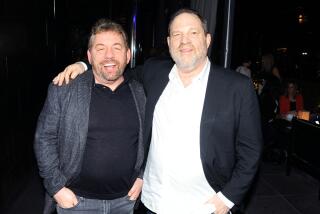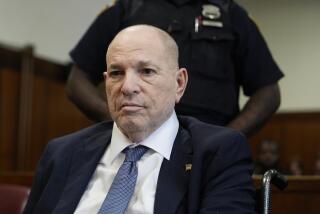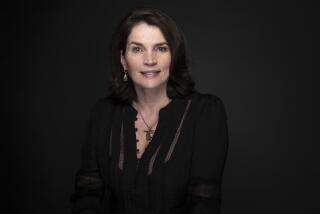Harvey Weinstein sexual assault case can move forward, judge rules

Harvey Weinstein arrived at a Manhattan courthouse Thursday as a judge decided on the future of his sexual assault case.
- Share via
Reporting from New York City — A judge in New York City on Thursday rejected a motion to dismiss charges of sexual assault against former Hollywood titan Harvey Weinstein.
For months, Weinstein’s legal team had attacked the reliability of his accusers and questioned the conduct of the New York Police Department and prosecutors. But for all the bluster, a hearing Thursday in Manhattan at which hundreds of pages of dismissal motions were rejected lasted fewer than 10 minutes.
Supreme Court Judge James Burke explained his ruling to the attorneys out of earshot of the gallery, and then set a pretrial hearing for March. Weinstein left the courthouse without answering shouted questions from reporters.
Weinstein has been under intense scrutiny since October 2017, when dozens of women came forward to accuse him of a wide array of misconduct. He was arrested by the NYPD in May and charged with six counts of sexual assault in Manhattan. Prosecutors said he forced former actress Lucia Evans to perform oral sex on him in 2004; attacked another woman, Mimi Haleyi, in 2006; and sexually assaulted an unidentified woman in a hotel in 2013.
The Times typically does not name women who make accusations of sexual assault, but Haleyi and Evans have told their stories in public.
Prosecutors dropped the charge related to Evans’ accusation in October after questions were raised about inconsistencies in her testimony. Weinstein’s attorney, Benjamin Brafman, has since argued that Evans’ “perjured” testimony poisoned a grand jury against the movie mogul and called for all charges to be dropped.
In court filings, Brafman also has pointed to email communications that took place between the remaining accusers and Weinstein after the dates of the alleged assaults. In one case, Brafman claims, an accuser attended a movie screening with Weinstein mere hours after she said he assaulted her in 2013.
“The emails demonstrate that these women who now allege sexual assault by Mr. Weinstein have for years engaged in loving and often intimate conversations with him before and after the date of the alleged assault,” Brafman wrote in a November filing.
Brafman has also alleged misconduct by police during the investigation and accused prosecutors of presenting an incomplete case to the grand jury.
In a six-page decision, Burke slapped down each of Brafman’s arguments. There was “no basis” for Brafman’s accusations of law enforcement malfeasance, according to the ruling, and Burke found that “the charges presented in the Grand Jury were supported by competent evidence and the proceedings were properly conducted.” He also ruled the dismissal of the charge stemming from Evans’ accusation had no bearing on the other charges.
The discovery of the email communications between Weinstein and his accusers that took place after the alleged assaults were not grounds for dismissing the indictment either, Burke ruled. The judge deemed “witness credibility” as an issue to be determined at trial.
During a brief news conference on the courthouse steps, Brafman said Burke’s ruling was “disappointing” but called it a technicality. Brafman said he remains confident that Weinstein will be acquitted if the case goes to trial. He lauded the ideals of fighting sexual harassment, but accused the #MeToo movement of pressuring the Manhattan district attorney’s office into filing charges against his client.
“If the MeToo movement helps level the playing field for women throughout the world, we are strongly supporting that movement. A movement should not, however, be permitted to push an indictment that is deeply flawed as we believe this movement has done,” Brafman said. “We are defending Harvey Weinstein on specific charges. We aren’t defending behavior.”
In addition to the Manhattan charges, Weinstein also remains the target of several civil lawsuits and faces potential prosecution in Southern California. Police in Los Angeles and Beverly Hills have built assault cases against Weinstein, and those cases have been presented to the Los Angeles County district attorney’s office. Prosecutors there have yet to make any filing decisions.
The Manhattan district attorney’s office declined to comment on Burke’s ruling Thursday, but in past court filings, prosecutors have repeatedly scoffed at Brafman’s assertions and claimed he was trying to wage a public relations campaign.
Legal experts have pointed out that the continued communications between the accusers and Weinstein are far from exculpatory, considering the women had aspirations in Hollywood, where Weinstein wielded considerable influence. Experts also said that the strategy being used by Weinstein’s legal team of attacking the credibility of his accusers could be viewed as offensive to any potential jury pool.
Gloria Allred, the well-known civil rights attorney who is representing Haleyi, pointed out that Weinstein’s legal strategy seems similar to the approach employed by Bill Cosby’s legal team in recent years. Cosby, she noted, now sits in a jail cell.
“That’s what they do, always try to put the victim on trial,” Allred said outside court Thursday.
Times staff writer Richard Winton contributed to this report.
Twitter: @JamesQueallyLAT
More to Read
Sign up for Essential California
The most important California stories and recommendations in your inbox every morning.
You may occasionally receive promotional content from the Los Angeles Times.











